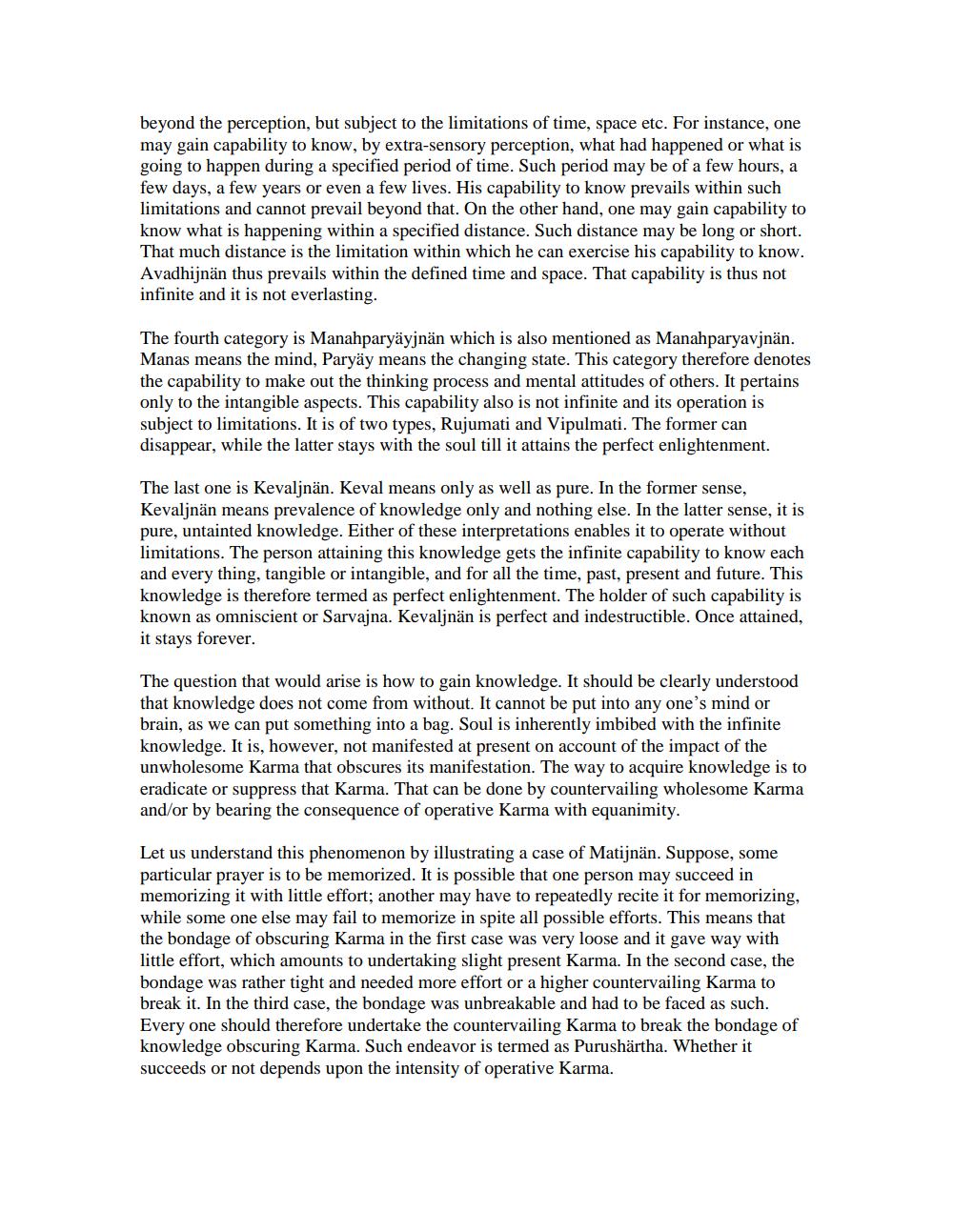Book Title: Spiritual Code and Restraints Author(s): Manu Doshi Publisher: Manu Doshi View full book textPage 5
________________ beyond the perception, but subject to the limitations of time, space etc. For instance, one may gain capability to know, by extra-sensory perception, what had happened or what is going to happen during a specified period of time. Such period may be of a few hours, a few days, a few years or even a few lives. His capability to know prevails within such limitations and cannot prevail beyond that. On the other hand, one may gain capability to know what is happening within a specified distance. Such distance may be long or short. That much distance is the limitation within which he can exercise his capability to know. Avadhijnän thus prevails within the defined time and space. That capability is thus not infinite and it is not everlasting. The fourth category is Manahparyäyjnän which is also mentioned as Manahparyavjnän. Manas means the mind, Paryäy means the changing state. This category therefore denotes the capability to make out the thinking process and mental attitudes of others. It pertains only to the intangible aspects. This capability also is not infinite and its operation is subject to limitations. It is of two types, Rujumati and Vipulmati. The former can disappear, while the latter stays with the soul till it attains the perfect enlightenment. The last one is Kevaljnän. Keval means only as well as pure. In the former sense, Kevaljnän means prevalence of knowledge only and nothing else. In the latter sense, it is pure, untainted knowledge. Either of these interpretations enables it to operate without limitations. The person attaining this knowledge gets the infinite capability to know each and every thing, tangible or intangible, and for all the time, past, present and future. This knowledge is therefore termed as perfect enlightenment. The holder of such capability is known as omniscient or Sarvajna. Kevaljnän is perfect and indestructible. Once attained, it stays forever. The question that would arise is how to gain knowledge. It should be clearly understood that knowledge does not come from without. It cannot be put into any one's mind or brain, as we can put something into a bag. Soul is inherently imbibed with the infinite knowledge. It is, however, not manifested at present on account of the impact of the unwholesome Karma that obscures its manifestation. The way to acquire knowledge is to eradicate or suppress that Karma. That can be done by countervailing wholesome Karma and/or by bearing the consequence of operative Karma with equanimity. Let us understand this phenomenon by illustrating a case of Matijnän. Suppose, some particular prayer is to be memorized. It is possible that one person may succeed in memorizing it with little effort; another may have to repeatedly recite it for memorizing, while some one else may fail to memorize in spite all possible efforts. This means that the bondage of obscuring Karma in the first case was very loose and it gave way with little effort, which amounts to undertaking slight present Karma. In the second case, the bondage was rather tight and needed more effort or a higher countervailing Karma to break it. In the third case, the bondage was unbreakable and had to be faced as such. Every one should therefore undertake the countervailing Karma to break the bondage of knowledge obscuring Karma. Such endeavor is termed as Purushärtha. Whether it succeeds or not depends upon the intensity of operative Karma.Page Navigation
1 ... 3 4 5 6 7 8 9 10 11 12 13 14 15 16 17 18 19 20 21 22 23 24 25 26 27 28 29 30 31 32 33 34 35 36 37 38 39 40 41 42 43 44 45 46 47 48 49 50 51 52 ... 69
